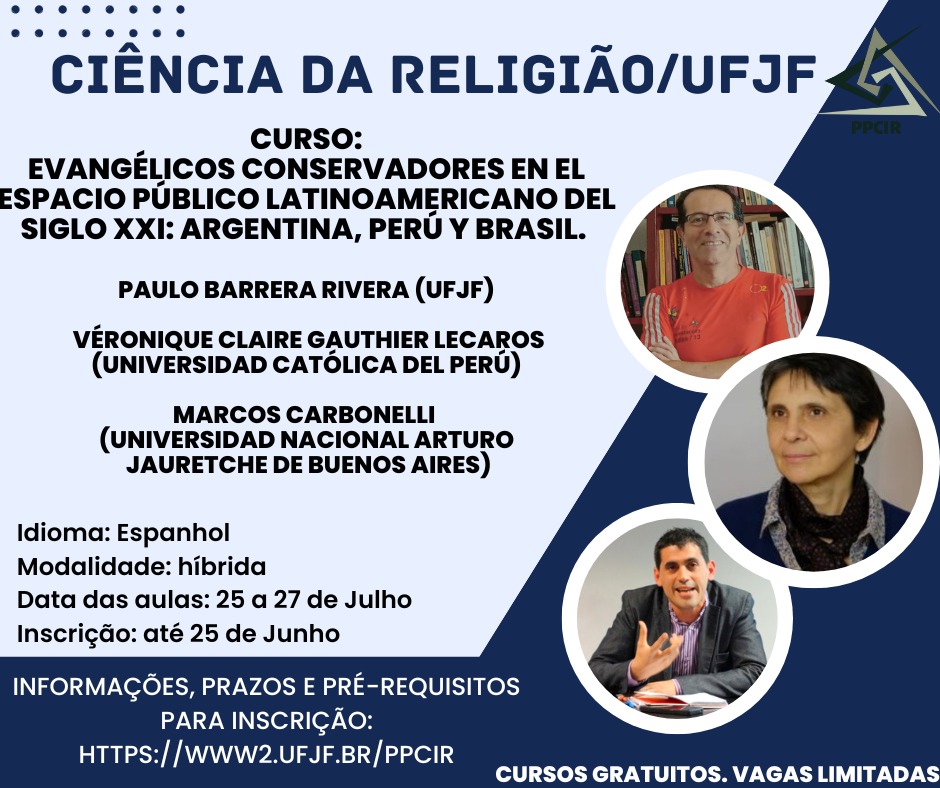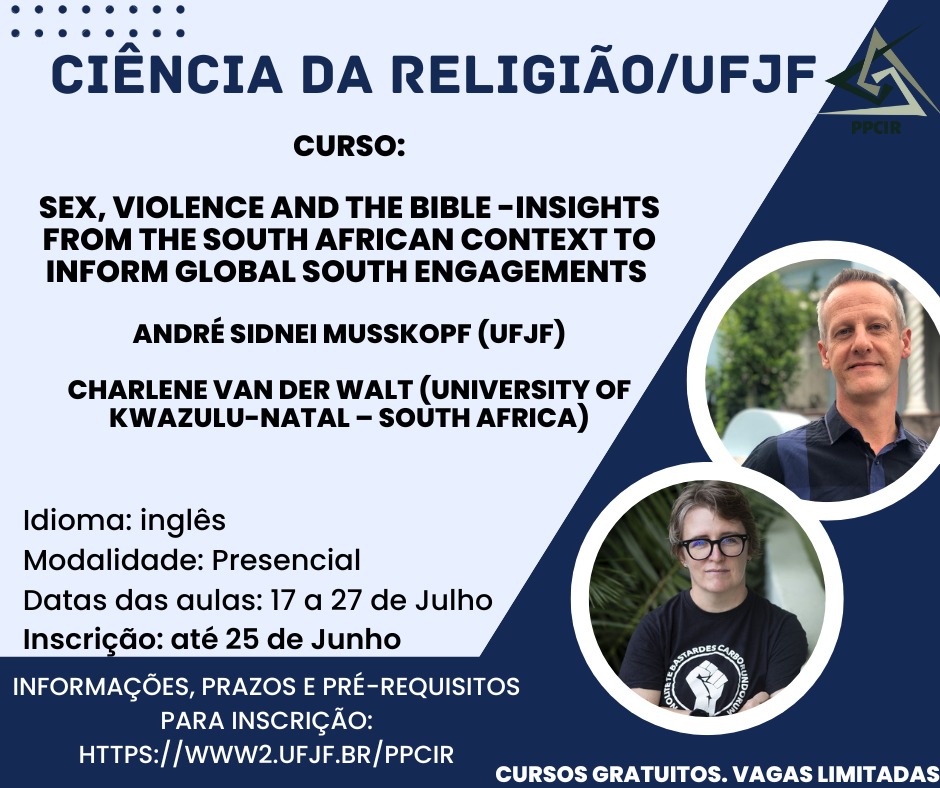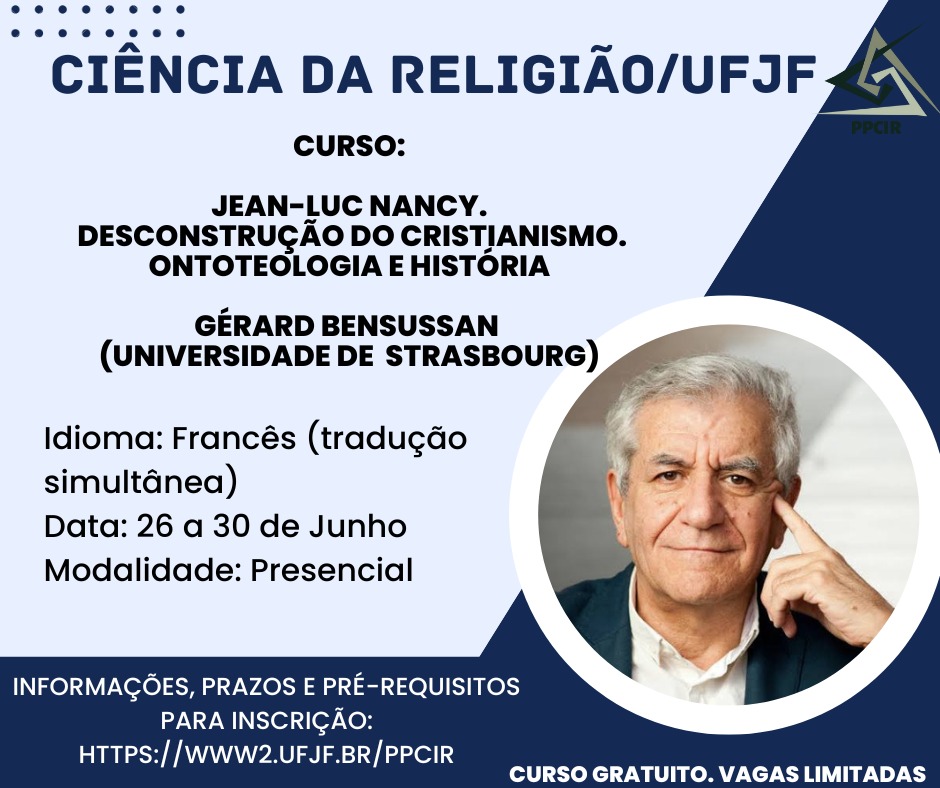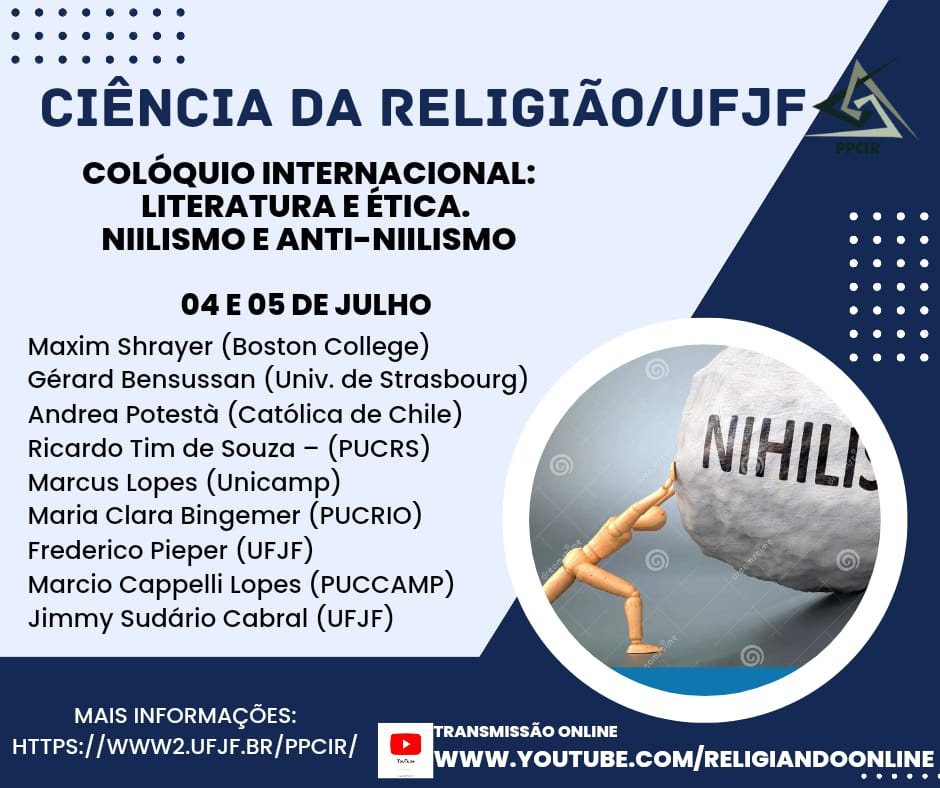Cursos e colóquio do Programa de Pós-graduação em Ciência da Religião (PPCIR) da UFJF em Junho e Julho
 Evangélicos conservadores en el espacio público latinoamericano del siglo XXI: Argentina, Perú y Brasil
Evangélicos conservadores en el espacio público latinoamericano del siglo XXI: Argentina, Perú y Brasil
O curso é parte do Global July, programa da Pró-reitoria de Pós-graduação e Pesquisa, e será ministrado em espanhol pela Prof. Dra. Véronique Lecaros da PUC Perú, pelo Prof. Dr. Marcos Carbonelli da Universidad Nacional Arturo Jauretche da Argentina e pelo Prof. Dr. Paulo Barrera do PPCIR (UFJF). O curso tem carga horária de 18h, acontece nos dias 25, 26 y 27 de julho de 2023. Abre 15 vagas para estudantes do PPCIR e 10 vagas para estudantes de outras universidades do Brasil. Será oferecido de modo presencial e a distância.
A visita dos professores convidados permitirá estreitar vínculos com outras universidades, construir novas parcerias e ampliar a internacionalização do PPCIR.
Para maior informação sobre o curso: Link do curso
As inscrições ocorrerão do dia 1 ao dia 25 de Junho

Sexo, violência e Bíblia – Curso do PPCIR integra a programação do Global July
Nos dias 17 a 27 de julho de 2023 ocorrerá o curso “Sex, violence and the Bible – Insights from the South African context to inform Global South engagements” no Programa de Pós-Graduação em Ciência da Religião da UFJF. O curso integra o Programa Global July 2023 –
International Courses.
O curso será ministrado pela Prof. Dra. Charlene van der Walt da University of Kwazulu-Natal,de Pietermaritzburg, África do Sul, em parceria com o Prof. Dr. André S. Musskopf do PPCIR/UFJF. A carga horária do curso é de 30/h e ocorrerá de forma presencial. Serão disponibilizadas 30 vagas, sendo 15 para estudantes da Pós-Graduação em Ciência da Religião e 15 para estudantes de graduação e pós-graduação de outros cursos da UFJF, bem como de outras instituições de ensino superior. O Global July é um programa da pró-reitoria de Pós-Graduação e Pesquisa (Propp) que tem como objetivo fortalecer os processos de internacionalização dos cursos de pós-graduação da UFJF. Além dos cursos oferecidos É de interesse aproveitar estes visitantes na UFJF para propor outras atividades, estreitar os laços de pesquisa internacional, trabalhar nos gupos de pesquisa, além de fortalecer os vínculos com os professores com quem está cooperando.
O curso será ministrado em inglês e mais informações podem ser obtidas no LINK.
As inscrições ocorrerão do dia 1 ao dia 25 de Junho
Outro cursos oferecidos pelo PPCIR

O programa em Ciência da Religião da UFJF divulga o minicurso Desconstrução do Cristianismo: ontoteologia e história.
Tema: Jean-Luc Nancy. Desconstrução do cristianismo. Ontoteologia e história
Gérard Bensussan (Univ. Strasbourg; UFJF)
Idioma: Francês (com tradução simultânea)
Data: 26 a 30 de Junho (14 às 16hs).
Modalidade: Presencial
As inscrições ocorrerão do dia 1 ao dia 25 de Junho

International Conference Literature and Ethics: nihilism and antinihilism
Literature and Ethics 1Literature and ethics 2
International Conference
Literature and Ethics: Nihilism and Antinihilism
Federal University of Juiz de Fora
July 04 a 05, 2023
Levinas’s philosophical criticism of Proust’s art, in which “all is dizzyingly possible “, is an important starting point for thinking about the relationship between literature and ethics. The exile of the poet from the city that follows his entry into the vertiginous rhythm of aesthetics inaugurates an experience of nihilism that crosses modern literature and atrophies the “muscles of the mind” necessary for ethics. Levinas’s judgment that “there is something egoist in artistic enjoyment” corresponds to the same hesitation in the face of aesthetics that we also find in Tolstoy, for whom the rhythm of art “dulls the mind” and could lead the firmest of consciences to dissolve in the mysteries of Sodom and Gomorrah. At the same time, the anti-nihilistic dimension present in modern literature, embodied in the art of Tolstoy himself, exposes a reality that questions the nihilistic character of literary experience and undoes, within the artistic process, the abyss that separates the ethical requirement from the aesthetic temptation. The antinihilist drive that shaped Ukrainian and Russian literature, from Nikolai Gogol to Vasily Grossman, points to the ethical requirement of literature that exposes itself to the risks of non-meaning and swings between the pendulum of nihilism and antinihilism.
Derrida’s affirmation, that literature is an institution which “allows one to say everything,” finds common ground with Levinas’ criticism of literature and translates the ambiguity of writings that found in literary performativity the possibility of an ethical event. By inscribing in reality an experience of “suspension of the law”, modern literature frees itself from all the traditional figure of the bond and makes possible a “being-suspended” which is faced with a differance and immeasurable reality. What Levinas described as the eruption of the “fantastic” places “the whole ‘real situation’ above a precipice”. Therefore, the Gogolian fantastic, the polyphony of Dostoevsky, the defamiliarization of Tolstoy, the involuntary of Proust—and the whole aesthetic constellation that crossed the 20th century—from Kafka to Guimarães Rosa—gives us a glimpse of the ethical concern and the “almost maniacal need for contact” of an anti-nihilist writing that feverishly sought ways to penetrate into the mystery of the other.
From this perspective, the conference will constitute a place for thinking on the possible relationships between ethics and literature, considering artistic and philosophical expressions from different latitudes
Conference Speakers
- Maxim D. Shrayer (Boston College)
- Gérard Bensussan (Université de Strasbourg)
- Andrea Potestà (Pontificia Universidad Católica de Chile)
- Ricardo Tim de Souza – (Pontificia Universidade Católica do Rio Grande do Sul)
- Renato Lessa (Pontificia Universidade Católica do Rio de Janeiro)
- Marcus Lopes (Unicamp)
- Maria Clara Lucchetti Bingemer (Pontificia Universidade Católica do Rio de Janeiro)
- Fernando Perlatto (Universidade Federal de Juiz de Fora)
- Frederico Pieper (Universidade Federal de Juiz de Fora)
- Marcio Cappelli Lopes (Pontificia Universidade Católica de Campinas)
- Jimmy Sudário Cabral (Universidade Federal de Juiz de Fora)
Thematic Panels
- Literature and ethics
- Nihilism and Philosophy
- Nihilism and Literature
- Literature, philosophy, and animal ethics
- Literature, nihilism, and war
- Literature, Faith, and Genocide
Guidelines
1) 1 or 2 speakers per paper. No more than one paper per author will be accepted;
2) Abstract between 200 and 350 words;
3) 3 to 5 keywords;
4) The text should contain the explanation of what is proposed with methodology, justification, objectives, and contribution to the work of the season;
5) Proposals are open until June 26th, 2023;
6) Papers in Portuguese, English, French, or Spanish will be accepted.
Conference registration by email: nerdt.ufjf@gmail.com
